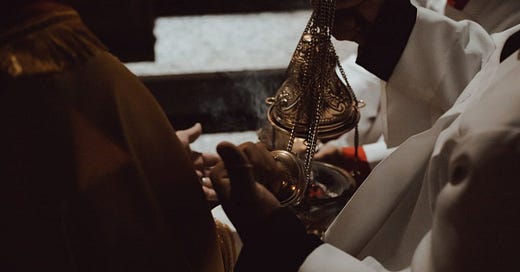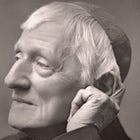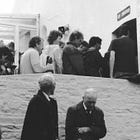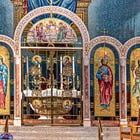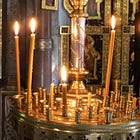Does Michael Lofton know what is meant by the word 'tradition'?
Tradition is not that which is old, but rather that which has been passed on and received. By referring to antiquated practices as 'traditional,' Michael Lofton raises questions as to his competence.

“It is absurd, and a detestable shame, that we should suffer those traditions to be changed which we have received from the fathers of old.”
The Decretals, cited by St Thomas Aquinas, Summa Theologica, Ia-IIae, Q. 97 A. 2
In this piece…
– What is tradition?
– Can abandoned or forbidden practices be called “traditional”?
– What is the problem with antiquarianism?
– Is there a culture of victim-blaming?
– Is the term “radical traditionalist” much more than a meaningless insult?
– What is the actual status of Holy Communion under both kinds?
– Some closing thoughts on situational awareness.
In an October 2022 video on his YouTube channel Reason & Theology, Mr Michael Lofton made the following claims about those whom he calls “radical traditionalists,” and their attitude towards the Novus Ordo Mass:
“If you have some misimpressions on what is traditional you might not actually appreciate some of the traditional aspects to the Novus Ordo, such as the restoration of the Chalice.”[1]
Unfortunately – as with his treatment of membership of the Church – it is Mr Lofton himself who appears to have “misimpressions” about the matter at hand.
His comment implies an equivalence between the words “traditional” and “old.” This is quite a common misunderstanding today, and this remark provides an opportunity to clarify these ideas.
What is tradition?
Something is not “traditional” because it is ancient – rather, something is traditional because it has been delivered and received, and has been established for some period of time.[2] This is clear in the etymology of word – in this context, the Latin word tradere means “to deliver.”
When theologians discuss the concept of tradition, they often are focused on that which has been divinely revealed. This is not what we have in view here – rather, we are considering those “ecclesiastical traditions” and rites mentioned in the pre-conciliar Profession of Faith, solemnly made in the sanctuary by converts, and by professors, priests and bishops (with their hands on the Gospels):
“The apostolic and ecclesiastical traditions and all other observances and constitutions of that same Church I most firmly admit and embrace. […]
“I also receive and admit the accepted [receptos – “received”] and approved rites of the Catholic Church in the solemn administration of all the aforesaid sacraments.”[3] (Emphasis added)
Even if “merely” ecclesiastical traditions are not what theologians primarily have in view when they discuss tradition, their treatment shows the truth of the definition given above. For example, Bainvel states in The Catholic Encyclopaedia:
“The word tradition (Greek paradosis) in the ecclesiastical sense, which is the only one in which it is used here, refers sometimes to the thing (doctrine, account, or custom) transmitted from one generation to another; sometimes to the organ or mode of the transmission.”[4] (Emphasis added)
Van Noort, talking of strictly divine tradition, asks the question with the same assumptions, “Where does the Church get its doctrine?” Here is his answer:
“… The only possible answer is that this doctrine comes to them from preceding generations by way of tradition. […]
“The term tradition may be understood in a variety of ways. Objectively it signifies the doctrine which has come down to us from antiquity. Actively, it indicates the act or series of acts by which that doctrine has been handed on. Used in its full connotation, it can mean both the doctrine which has been handed down and also the process of handing down that doctrine.”[5] (Emphasis added)
Agius makes the same point:
“The word Tradition, considered in its object, means whatever is delivered or transmitted: In this sense it Is called objective tradition. If we consider, however, the act, or the way and the means, by which an object is propagated and transmitted, this is called active tradition.”[6] (Emphasis added)
In the set of lectures published as The Present Position of Catholics in England, Cardinal Newman reaffirmed part of a description of the Catholic view of tradition which he had written as an Anglican. It further expresses the same ideas:
“By tradition they mean the whole system of faith and ordinances, which they have received from the generation before them, and that generation again from the generation before itself. […]
“Tradition is uniform custom. It is silent, but it lives. It is silent like the rapids of a river, before the rocks intercept it. It is the Church’s… habit of opinion and feeling, which she reflects upon, masters and expresses, according to the emergency.”[7]
As a comment on these words, Newman wrote: “I see nothing to alter in these remarks, written many years before I became a Catholic.”[8]
This is sufficient to show that Mr Lofton’s understanding of what constitutes “tradition” is at best unhelpful in these debates.
However, let’s dig a little deeper into the Church’s relationship with tradition – and examine the “otherising” moniker used by Mr Lofton and others, viz. “radical traditionalist.”
Desuetude
In each successive generation, the ecclesiastical magisterium proposes and re-proposes the whole body of the Church’s teaching. What was defined 1,500 years ago (or more) remains true today, and remains traditional today – even if, hypothetically, a given definition has not been specifically reaffirmed for a period of time. In fact, the more ancient a doctrine, the more obviously authoritative it is.
The same, however, cannot necessarily be said about the terms in which dogmas are expressed. It may be possible to find earlier doctors or theologians who express ideas in terms that we would no longer use, due to the progression of debates, controversies and the adoption of more precise definitions. As Pius XII taught:
“Clearly no sincere Catholic can refuse to accept the formulation of Christian doctrine more recently elaborated and proclaimed as dogmas by the Church, under the inspiration and guidance of the Holy Spirit with abundant fruit for souls, because it pleases him to hark back to the old formulas.”[9]
The Church extends this principle very far. She condemned the Synod of Pistoia’s treatment of the holy Eucharist, not because it denied dogma or doctrine per se, but because it “disregard[ed] the scholastic questions about the manner in which Christ is present in the Eucharist,” and specifically because it “absolutely omitt[ed] to make any mention of transubstantiation”:
“[B]y an indiscreet and suspicious omission of this sort knowledge is taken away both of an article pertaining to faith, and also of the word consecrated by the Church to protect the profession of it, as if it were a discussion of a merely scholastic question.”[10]
In fact, Pius VI condemned the Pistoian expression as “dangerous, derogatory to the exposition of Catholic truth about the dogma of transubstantiation, favourable to heretics.”[11] In other words, a mere appeal to what was in use in antiquity is not necessarily legitimate – and when it entails the rejection of what has been received, it cannot be called “traditional.”
Something similar applies, as a matter of reason, to liturgical customs and disciplines which have fallen into desuetude – such as communion under both kinds in the Latin rite. Such obsolete practices may well be good and venerable in themselves, and it might be good or bad for them to be reintroduced today: but calling them “traditional” is just an abuse of terms.[12]
Antiquarianism
We should be aware that throughout the pontificate of Pius XII, Catholics were repeatedly warned about the dangers of Protestantising antiquarianism. For instance, in his Encyclical Mediator Dei, Pius XII warned about some of the liturgical changes proposed by scholars – for example:
Using tables instead of altars
Abandoning the Latin language
Using crucifixes depicting the risen (rather than suffering) Christ.[13]
Pius XII called these ideas “straying from the straight path”. While early practices were “worthy of all veneration”, he said, Catholics must not esteem them as better just because they carry “the savor and aroma of antiquity.”[14] He continued:
“The temerity and daring of those who introduce novel liturgical practices, or call for the revival of obsolete rites out of harmony with prevailing laws and rubrics, deserve severe reproof.”[15]
Elsewhere, he writes:
“[O]bviously unwise and mistaken is the zeal of one who in matters liturgical would go back to the rites and usage of antiquity, discarding the new patterns introduced by disposition of divine Providence to meet the changes of circumstances and situation.”[16]
It is no doubt true, he says, that “from time to time […] certain devotions long since forgotten are revived and practiced anew” – and that “[a]ll these developments attest to the abiding life of the immaculate Spouse of Jesus Christ through these many centuries.”[17]
But there is a definite sense in which what has developed and been passed down during the Church’s progress through history must be respected and cherished. He continues, rebuking “the case of some persons who are bent on the restoration of all the ancient rites and ceremonies indiscriminately”:
“The liturgy of the early ages is most certainly worthy of all veneration. But ancient usage must not be esteemed more suitable and proper, either in its own right or in its significance for later times and new situations, on the simple ground that it carries the savor and aroma of antiquity.
“The more recent liturgical rites [viz. what we today call “the Traditional Latin Mass” and associated rites] likewise deserve reverence and respect. They, too, owe their inspiration to the Holy Spirit, who assists the Church in every age even to the consummation of the world.”[18]
Some may suggest that the pope’s rebukes are just aimed at those who would innovate on their own authority. But if this was only point at stake, there would be no need to treat the matter with such detail. Clearly, there is something fundamentally problematic with the concept of antiquarianism itself – even if the revival of antique practices can be legitimate.
There are also practical risks associated with a lack of piety towards tradition – especially when it comes to the converse problem of stripping things away. In their 1898 Vindication of the Bull Apostolicae Curae, the English Bishops gave the following comments on the idea of tinkering with the liturgy, on the pretext of returning to antiquity:
“[The idea that local churches were] permitted to subtract prayers and ceremonies in previous use, and even to remodel the existing rites in the most drastic manner, is a proposition for which we know of no historical foundation, and which appears to us absolutely incredible.[…]
“Immemorial usage, whether or not it has in the course of ages incorporated superfluous accretions, must, in the estimation of those who believe in a divinely guarded, visible Church, at least have retained whatever is necessary; so that in adhering rigidly to the rite handed down to us we can always feel secure; whereas, if we omit or change anything, we may perhaps be abandoning just that element which is essential.”[19]
The bishops make two points here: that God has guided the Church’s liturgy; and that we must humbly receive it. This passage beautifully expresses the docility and piety which we must have towards our received tradition.
It is also quite clear from this text that tradition is “what has been received” – not the many possible practices that may be restored from antiquity, at the expense of what is actually traditional.
The point is this: the Church has the power to enact and abolish practices as she sees fit, but she does not have the power to make something “traditional” by a mere ipse dixit – any more than she has the power to make an error become true by defining it ex cathedra. This is just a category error.
As the saying goes: “It is what it is – and it isn’t what it isn’t.”
Victim-blaming
Given such texts and warnings from the magisterium, it should not be surprising if many Catholics were suspicious or rejected certain liturgical changes which arose in the 1960s and 1970s – not least because they were accompanied by a shocking collapse of faith and practice at the same time.
Let us recall the absolutely certain fact, shorn of all interpretation or explanation: the period following Vatican II was marked by massive apostasy, an almost-total breakdown of the passing on of the faith and enforcement on the part of Rome and the hierarchy, and a radical change in the week-to-week experience of practising Catholics across the Latin rite.
It is obvious, however, that many of a younger generation today do not really understand the devastation of that period – but these are the facts. One can explain or justify these facts as one wishes, but they are not open to dispute.
What were Catholics to do?
In one of his epistles, St Paul tells us to “stand fast, and hold the traditions, which [we] have learned, whether by word or by our epistle.” (2 Thess. 2.14).
This is our first duty, when confronted with something that contradicts or requires us to abandon what we have received: to stand fast and hold to tradition. It is our first duty because it is the clearest duty: we know that what we have received is good and true.
But the situation cannot be resolved with simplistic claims that the changes came from authority. As we all know, St Paul also tells us the following:
“[T]hough we, or an angel from heaven, preach a gospel to you besides that which we have preached to you, let him be anathema.
“As we said before, so now I say again: If any one preach to you a gospel, besides that which you have received, let him be anathema.” (Gal. 1.8-9)
With all this in mind, I invite the reader to imagine himself in the position of a convert who has solemnly professed his loyalty to the “ecclesiastical traditions” and the “accepted and approved rites” in the Profession of Faith already discussed, in his parish’s sanctuary, with his hand on the Gospels.
Perhaps this profession was made with the great social or familial costs that can accompany conversion to the Catholic faith.
Alternatively, the reader could imagine himself in the position of a bishop or priest who has publicly professed the same loyalty – perhaps having made this profession multiple times, for each new office.[20]
When confronted with a radical departure from the ecclesiastical traditions and the traditional rites – and in the face of warnings from the hierarchy about the dangers of such departures – can such persons (or their heirs) be blamed for holding themselves to be bound by their solemn professions, and by these magisterial warnings?
Should they be blamed because they stood fast, and held to the traditions which they have received?
This would be far too simplistic, and show a serious lack of nuance. And yet nonetheless, when Mr Lofton and others call these persons and their heirs “radical traditionalists”, they are implicitly taking the side of those responsible for all this destruction.
“Radical Traditionalists”
The word “radical” is a word which is too political and imprecise to be much more than an insult. It is normally used by those who wish to establish their own views as normative, and themselves as reasonable “moderates.” Naturally, it is also used to designate various groups as “other,” and as vaguely disreputable.
But this very word “radical” can help us – and those who use it to “otherise” their opponents – to understand the present ecclesial landscape.
Some have tried, over the years, to reclaim the word “radical” as a badge of honour – but in fact, the word typically denotes a favouring of fundamental change, and has strong associations with revolution and revolutionary politics. Nothing could be less appropriate in reference to traditional Catholics.
Along these lines, I propose that those who seek to shore up a conservative settlement of the Vatican II changes are playing a role that has recurred in various major revolutions in history.
There is nothing new under the sun. After the initial period of frenzy – be it of the French Revolution, the Russian Revolution, or the English Reformation – a more moderate faction emerges, and seeks to restore some level of equilibrium. In some cases, as with Kerensky or the Girondins, these moderate factions fail and are swept away; and in others, as with Napoléon or the Anglican Elizabethan Settlement, they succeed (at least for a time).
There may have been many noble and admirable men in these moderate factions (including the moderate conciliar faction today). But each of these factions remained the products of the revolution in which they were born. They continued to accept the revolution’s “Year Zero”, and they continued to be imbued with its ideals, presuppositions and agendas. This alignment is all the more clear for their condemnations of those who pre-dated their revolutions and took no part in the them at all.
One thing is certain: no matter how good their intentions, under no circumstances can these moderate factions be considered as the legitimate heirs of the older orders – any more than the Elizabethan settlement represents the continuation of the Catholic Church in England. They are the heirs of a “radical” rupture with each older order, and they seek to moderate their given revolutions only to the degree that their own private judgment dictates, or to the degree that is necessary to stabilise the “advances” made.
As far as the various anciens régimes would be concerned, these moderate factions are just as “radical” as their more obviously destructive colleagues.
If this regrettable and largely meaningless word “radical” is to be applied to anyone – and it would be better if we refrained from such wanton language – then it should not be to those who stood still and simply continued to practice the Catholic religion, but rather to these would-be “moderates” who are the heirs and defenders of the conciliar revolution.
But one can take or leave these ideas, which are straying from the main point – the meaning of the word “tradition.” With that in mind, let’s briefly turn to the practice of Communion under both kinds.
Communion under both kinds
The reception of Holy Communion under both kinds is indeed, in the Latin Rite, an ancient practice. Regarding Communion under one kind, the Catholic Encyclopaedia says that “[i]t is impossible to say exactly when the new custom became universal or when, by the Church’s approval, it acquired the force of law,” but that it is basically shown to be so (even with intermittent exceptions) by a 1415 decree at the Council of Constance.[21] Needless to say, the practice was very widespread much earlier than this.
As such, as we have seen, there is little sense in which “the restoration of the Chalice” to the laity in the Latin rite can be said to be traditional. It has been obsolete for centuries.
By contrast, the reception of Holy Communion under both kinds is the constant and received practice of Eastern rites – and for this reason, it certainly is traditional for them. But this same practice has been out of use (and even forbidden) for several centuries in the Latin rite.
Note again, that this is not to say that there is something intrinsically wrong with Holy Communion under both kinds. Nor is it to enter an argument about the prudence of its restoration. Nor is it to deny that the Church has the right to restore Holy Communion under both kinds.
These questions are completely separate to whether or not this practice is traditional. Blurring these matters shows a profound confusion of thought.
But given how frequently Mr Lofton criticises those whom he calls “radical traditionalists”, it seems reasonable to ask that he work with a clear and correct understanding of the nature of tradition itself.
Conclusion
By claiming that Holy Communion under both kinds in the Latin rite is traditional, Mr Lofton himself shows significant “misimpressions” of the nature of tradition, and of the very word “tradition” itself. This “misimpression” has been an opportunity to clarify the basic meaning of the word “tradition”, and to mention in passing some factors which are neglected in the current discussions. The unfortunate reality is that Mr Lofton seems to lack a sound understanding of the relevant terminology or arguments – as I have also previously discussed.
Mr Lofton has often complained that traditional Catholics do not engage with his videos – but someone who does not understand the arguments of his interlocutors has little to add to the conversation – and someone who refuses to understand has even less. It is also unfortunate that he does not respond to substantial engagement, and chooses to refute the weakest arguments or most excessive positions instead of “steel-manning” those whom he opposes.[22] These are not the actions of someone who really wants engagement.
Further: it is most unfitting for a recent convert in Mr Lofton’s position to be lecturing, mocking, criticising, and condemning traditional Catholics of the Latin Rite in the way that he does.
Although many of his videos are aimed at other would-be YouTube influencers, his condemnations pass through such persons, onto those who have suffered for the Catholic religion under the conciliar revolution for decades. Even if Mr Lofton wishes to defend Vatican II and the conciliar popes, there is no doubt that these persons – particularly the older generation, many of whom are still alive today – have been confessors of the faith in a ghastly period of apostasy and tyrannical misrule.
This is a strikingly unjust way to treat these persons, who have lovingly suffered for Christ and his Church in a myriad of ways.
A little bit of historical and situational awareness, humility, respect and basic human kindness would go a long way for Mr Lofton’s credibility.
Finally, it is necessary to reaffirm something which has become a cliché – but is no less true.
Eastern Catholics display an admirable fierceness in defending their own traditions from even any hint of Latin encroachment – even if this fierceness sometimes goes too far[23].
In light of this, it is extremely unfitting for an Eastern Catholic like Mr Lofton to be telling us Latins what is and is not a part of our tradition.
Further Reading
HELP KEEP THE WM REVIEW ONLINE!
As we expand The WM Review we would like to keep providing free articles for everyone. If you have benefitted from our content please do consider supporting us financially.
A subscription from you helps ensure that we can keep writing and sharing free material for all.
Plus, you will get access to our exclusive members-only material!
Thank you!
Follow on Twitter and Telegram:
[1] Michael Lofton, ‘Ask Me Anything | R&T Live | 10.18.2022’ on Reason and Theology Live, Available at https://youtu.be/9Pg45OlY6tM?t=874
[2] The Cambridge English Dictionary defines tradition thus: “a belief, principle, or way of acting that people in a particular society or group have continued to follow for a long time, or all of these beliefs, etc. in a particular society or group.” https://dictionary.cambridge.org/dictionary/english/tradition
[3] Denzinger (DZ) 995-6 (https://patristica.net/denzinger/). Cf. also Roberto de Mattei, The Second Vatican Council: An Unwritten Story, Loreto Publications, Fitzwilliam NH 2012. 507. Cf. the substitution for this Profession of Faith for Canon 1406 (1917) here: https://www.vatican.va/roman_curia/congregations/cfaith/documents/rc_con_cfaith_doc_19670717_formula-professio-fidei_en.html
[4] Bainvel, J. ‘Tradition and Living Magisterium’, in The Catholic Encyclopedia, Robert Appleton Company, New York. Retrieved January 31, 2023 from New Advent: http://www.newadvent.org/cathen/15006b.htm
[5] Monsignor G. Van Noort, S.T.D., Dogmatic Theology, Volume III, The Sources of Revelation, Divine Faith, Translated and Revised by John J. Castelot, S.S., S.T.D., S.S.L. & William R. Murphy, S.S., S.T.D., The Newman Press, Westminster, Maryland, 1961, pp 3-4
[6] Fr George Agius, Tradition and the Church, Stratford, Boston, 1928, 1.
[7] John Henry Cardinal Newman, Lectures on the Present Position of Catholics in England, Longmans Green and Co, London, 1908, p 327.
[8] Ibid.
[9] Pius XII, Encyclical Mediator Dei (“MD” Hereafter), 1947, 63. http://www.vatican.va/content/pius-xii/en/encyclicals/documents/hf_p-xii_enc_20111947_mediator-dei.html
[10] DZ 1529.
[11] Ibid.
[12] It might be argued that we talk, in everyday parlance, of “creating new traditions.” This is true, but it would be wrong to expect precision in everyday language. What this phrase means, evidently, is the enacting of a practice which will, at some point in the future, be deemed to be traditional by virtue of its long establishment and progressive transmission. But there is little sense in which such a “new tradition” is a tradition until that has happened. As such, even if it were to be argued that communion under both kinds in the Latin rite has now become traditional by virtue of the last sixty years, this has no bearing on whether it was traditional when it was established – and it is this that is entailed in Mr Lofton’s analysis of his opponents’ ideas.
[13] Pius XII, Encyclical Mediator Dei (“MD” Hereafter), 1947, n. 60, 2. http://www.vatican.va/content/pius-xii/en/encyclicals/documents/hf_p-xii_enc_20111947_mediator-dei.html
[14] MD 8, 61
[15] MD 59
[16] MD 63
[17] Dz 1533
[18] MD 61
[19] Cardinal Archbishop and Bishops of the Province of Westminster, A Vindication of the Bull “Apostolicæ Curæ”, Longmans Geen, and Co, London, 1898, Ch 24 pp 22-3. http://www.a-c-r-f.com/documents/ENGLISH_BISHOPS-Vindication_Apostolicae_curae.pdf
[20] Canon 1406 (1917). Cf. also Cardinal Ruffini: “How can you claim that the Church, Mater et Magistra […], to whom it pertains to judge the true sense of sacred scripture — as we have sworn many times before the altar (cf. the Profession of the Catholic Faith) […]”. Quoted in de Mattei 142.
[21] Patrick Toner, ‘Communion under Both Kinds’, In The Catholic Encyclopedia, Robert Appleton Company, New York, 1908. Retrieved January 31, 2023 from New Advent: http://www.newadvent.org/cathen/04175a.htm
[22] For instance, in one video he asks: “Why do some promoters of the Society of Saint Pius X misinterpret the words of demons and then use the allegedly reliable testimony of demons to promote their cause?” But Mr Lofton must know that the word “some” suggests that this is a relatively common phenomenon, reflecting badly on the Society of St Pius X – whereas it forms no part whatsoever of their own explanation of their position, even if certain laymen make such claims.
In another video, he presents an oblique “refutation” of the sedevacantist conclusion by a satirical read-through of Br Peter Dimond’s views on where to receive the sacraments. Again, Mr Lofton must know that a) the arguments for sede vacante – even those made by Br Dimond himself – stand logically distinct from Br Dimond’s other views on related topics, and so are not susceptible to a reductio ad absurdum in this way; and b) that Br Dimond is a figure whose views are not shared by the majority of those who agree about the sede vacante question.
Following the debate with Br Peter Dimond – and given some of Mr Lofton’s complaints – Mr John Lane broached the topic of a more serious debate with him, and received no answer. As previously stated, my own engagement on the topic of membership was rejected because Mr Lofton said that he did not know who I was.
These tactics are not a credible means of engaging with those whom one has decided are one’s opponents.
[23] Some persons claim that, in the absence of an Eastern Catholic liturgy (or even a liturgy of their own sui juris church), they are entitled to attend the liturgies of schismatics rather than the Roman Rite. For instance, “Fr Bo and Fr Stephen” of the Ukrainian Catholic Eparchy of Edmonton state in an answer to a question published in December 2020: “So, there is no sin for a Ukrainian Catholic in attending an Orthodox service, especially when one cannot attend a Ukrainian Catholic service.” (Emphasis added).
This is a significantly different concept to what was taught (for example) McHugh and Callan’s Moral Theology, which considers the various different types of participation possible, and adds:
“964. It is unlawful for Catholics in any way to assist actively at or take part in the worship of non-Catholics (Canon 1258). Such assistance is intrinsically and gravely evil; […] (b) if the worship is Catholic in form, but is under the auspices of a non-Catholic body (e.g., Baptism as administered by a Protestant minister, or Mass as celebrated by a schismatical priest), it expresses either faith in a false religious body or rebellion against the true Church.”
The text further states:
“968(a). If on Sunday, one is where there is only a schismatical church, one is excused from the obligation of hearing Mass, and may not hear Mass in that church (Holy Office, December 5, 1608; August 7, 1704).”
‘Is it a sin to attend an Orthodox Church?’ Ask a Priest, Ukrainian Catholic Eparchy of Edmonton, December 2020, accessed January 2023. https://eeparchy.com/2020/12/04/is-it-a-sin-to-attend-an-orthodox-church/
McHugh & Callan, Moral Theology – A Complete Course Based on St. Thomas Aquinas and the Best Modern Authorities, Vol. I, Joseph F. Wagner, Inc., New York, 1958.
Consider also some of the comments discussed here: https://www.byzcath.org/forums/ubbthreads.php/topics/69239/1

